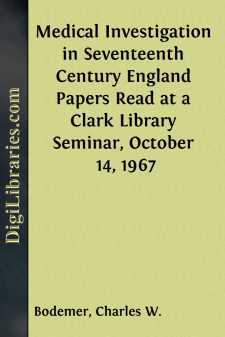Categories
- Antiques & Collectibles 13
- Architecture 36
- Art 48
- Bibles 22
- Biography & Autobiography 813
- Body, Mind & Spirit 142
- Business & Economics 28
- Children's Books 17
- Children's Fiction 14
- Computers 4
- Cooking 94
- Crafts & Hobbies 4
- Drama 346
- Education 46
- Family & Relationships 57
- Fiction 11829
- Games 19
- Gardening 17
- Health & Fitness 34
- History 1377
- House & Home 1
- Humor 147
- Juvenile Fiction 1873
- Juvenile Nonfiction 202
- Language Arts & Disciplines 88
- Law 16
- Literary Collections 686
- Literary Criticism 179
- Mathematics 13
- Medical 41
- Music 40
- Nature 179
- Non-Classifiable 1768
- Performing Arts 7
- Periodicals 1453
- Philosophy 64
- Photography 2
- Poetry 896
- Political Science 203
- Psychology 42
- Reference 154
- Religion 513
- Science 126
- Self-Help 84
- Social Science 81
- Sports & Recreation 34
- Study Aids 3
- Technology & Engineering 59
- Transportation 23
- Travel 463
- True Crime 29
Medical Investigation in Seventeenth Century England Papers Read at a Clark Library Seminar, October 14, 1967
Description:
Excerpt
To discuss embryological thought in seventeenth-century England is to discuss the main currents in embryological thought at a time when those currents were both numerous and shifting. Like every other period, the seventeenth century was one of transition. It was an era of explosive growth in scientific ideas and techniques, suffused with a creative urge engendered by new philosophical insights and the excitement of discovery. During the seventeenth century, the ideas relating to the generation and development of organisms were quite diverse, and there were seldom criteria other than enthusiasm or philosophical predilection to distinguish the fanciful from the feasible. Applying a well-known phrase from another time to seventeenth-century embryological theory, "It was the best of times, it was the worst of times, it was the age of wisdom, it was the age of foolishness."
Embryology underwent some very significant changes during the seventeenth century. At the beginning of the century, embryology was descriptive and clearly directed toward morphological goals; by the end of the century, a dynamic, more physiological attitude was apparent, and theories of development derived from an entirely different philosophic base. During this time, English investigators contributed much, some of ephemeral, some of lasting importance to the development of embryology. For this discussion, we will divide the seventeenth century into three overlapping, but generally distinct, periods; and, without pretence of presenting an exhaustive exposition, we will concentrate upon the concepts and directions of change characteristic of each period, with primary reference to those individuals who best reveal the character of seventeenth-century English embryology.
An understanding of the characteristics of embryological thought at the beginning of the seventeenth century may enhance appreciation of later developments. During the latter part of the sixteenth century, the study of embryology was, for obvious reasons, most often considered within the province of anatomy and obstetrics. From Bergengario da Capri to Jean Riolan the Younger, study of the fetus was recommended as an adjunct of these subjects, and it required investigation by direct observation, as decreed by the "restorers" of anatomy. Embryonic development was, however, also studied independently of other disciplines by a smaller group of individuals, and the study of chick development by Aldrovandus, Coiter, and Fabricius ab Aquapendente laid the basic groundwork of descriptive embryology. In either case, during the last half of the sixteenth century the attempt of the embryologist to break with the traditions of the past was overt, although consistently unsuccessful. When dealing with the fetus, the investigators of this period were, almost to a man, Galenists influenced to varying degrees by Hippocrates, Aristotle, and Avicenna. Each felt compelled to challenge the immediate authority, and yet their intellectual isolation from the past was incomplete, and their views on embryogeny corresponded with more often than they differed from those of the person they railed against.
Embryology emerged as a distinct scientific discipline during the last half of the sixteenth century and early years of the seventeenth century as a result of the aforementioned investigations of Aldrovandus, Coiter, and Fabricius. Concerned with description and depiction of the anatomy of the embryo, they established a period of macro-iconography in embryology. The macro-iconographic era was empirical and based upon first-hand observation; it was concerned more with the facts than with the theories of development. This empiricism existed in competition with a declining, richly vitalistic Aristotelian rationalism which had virtually eliminated empiricism during the scholastic period. However, the decline of this vitalistic rationalism coincided with the rise of a mechanistic rationalism which had its roots in ancient Greek atomistic theories of matter....


